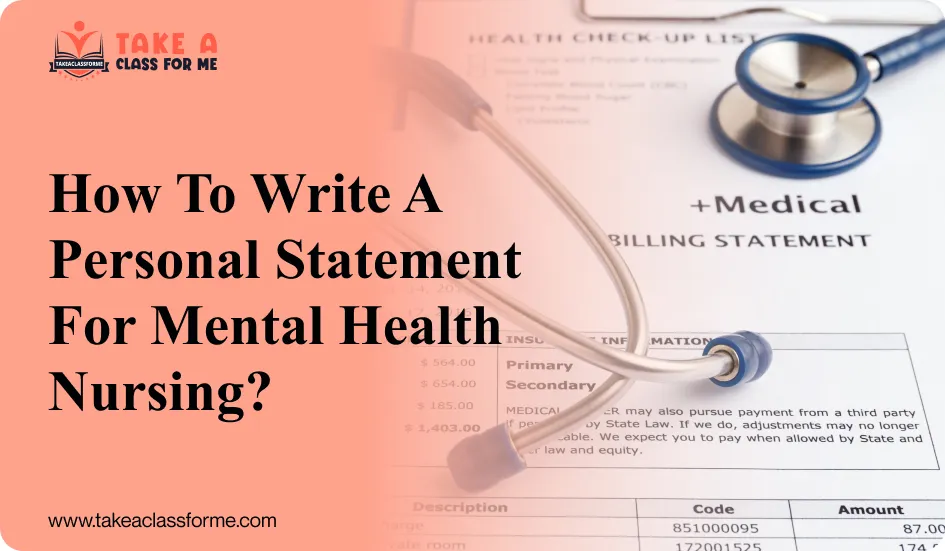
Personal Statement; A Step-By-Step Guide
Ever thought your words would have the power to grant you access to a successful career in mental health nursing? Writing a personal statement isn’t just a formality, it is your hotshot chance to rise above the crowd. In a sea of applicants, your personal statement is what distinguishes you from the rest.
A personal statement introduces you to the admission committee, highlighting what you are beyond the test scores. Use the chance well to tell them your story, show your passion for mental health nursing, and establish why you are the perfect fit for the field.
If you are someone struggling to write a personal statement, then this blog is just for you! The blog aims to inform you how to write a personal statement for mental health nursing.
Everything You Need To Know About Personal Statement For Mental Health Nursing
What is a Personal Statement?
A personal statement is like a story where you present your narrative to the reader, showcasing your motivation, experience, and goals. It helps admission committees to decide what you are beyond your academic records and makes the selection process easier for them.
Role in the Nursing Application Process
- Shows motivation: A personal statement for nursing school often highlights what inspired you to pursue a career in the mental health field. It is a useful tool to show your commitment and determination towards the field.
- Highlight nursing experiences: A personal statement gives you a chance to highlight your healthcare experiences relevant to nursing, like volunteer activities or personal experiences.
- Demonstrate Fit: Each institute has different requirements for the selection process. A personal statement is a way to align your values, goals, and skills with the institute and make them realize that you are the perfect fit.
- Personal Qualities: A personal statement is a great way to introduce your non-academic skills such as empathy or communication skills. These skills are extremely important in mental health nursing.
Importance for Mental Health Nursing Programs
- A personal statement conveys your genuine and deep understanding of mental health nursing.
- Mental health is a field that requires you to have core skills such as empathy and compassion so that you can relate to the patients. A personal statement helps you show how your inherent skills or personal experiences have prepared you for this role.
- A personal statement for mental health nursing programs conveys your ability to deal with challenging situations and if you can work with a diverse population.
- It also shows your commitment to growth in the field.
Features of a Strong Mental Health Nursing Personal Statement
Writing a strong personal statement is a key requirement for admission to a nursing school. Like any other essay, it should have three main parts; introduction, body, and conclusion.
Introduction
Introduction is your opening handshake with the admission committee, so it should be compelling enough to draw their attention. It sets the stage for the rest of your story.
Writing a personal statement for nursing involves starting it with a powerful personal anecdote that screams your interest in mental health nursing. This could be a short meetup or a moment of inspiration that helps build a personal connection with the field.
Cross every box on your ‘why’ list and briefly state your objectives, why you chose the field, and how the program is a stepping stone for your dreams.
Main Body
The main body of your personal statement is proof of your qualifications and your suitability for the program. It should be organized and touch a few key areas;
Relevant Experience: A perfect mental health nursing personal statement example would include experience related to mental health gained through work, volunteering, or interaction with the healthcare staff.
Academic Background: Discuss your academic background and list down all those achievements such as coursework, assignments, or research projects that in some way have prepared you for mental health nursing.
Skills: The body includes common skills that are required to deal with day-to-day mental health nursing situations. Some common skills important to nursing are;
- Empathy
- Communication
- Problem-solving
- Resilience
Conclusion
The conclusion wraps up your personal statement by summarizing the key points and highlighting your commitment to the field. It should leave a lasting impression on the reader.
A common way of leaving a trail on the readers is by connecting your motivation to the program you are applying for. A conclusion should contain a brief mention of the future goals and a positive remark about your growth in the field.
Step-by-Step Guide to Writing A Personal Statement
Writing a perfect personal statement can be a challenge sometimes. Let’s look at some Personal statement advice for nursing to make the process easier.
Step 1: Start with a Strong Opening
Start with a bang to capture the attention of the readers. You’re halfway there if you’ve actually crafted a great start. Start your statement with an engaging nursing story, a thoughtful question, or a vivid mental health description. Make sure that the statement captures the seriousness of the field and shows your enthusiasm at the same time. It should synchronize with the rest of your statement.
Step 2: Show Your Passion for Mental Health
Light up the personal statement by showing your passion for mental health. Make sure your reader knows about your interest in the field and what motivates you to choose this as a career.
Include any personal experience that sparked your interest such as personal challenges or interaction with mental health services. You can also discuss aspects or approaches of mental health that fascinate you.
Step 3: Highlight Relevant Experience
If you review some of the best personal statement examples for nursing, you generally observe that candidates often provide proof of their qualifications and they somehow relate them to mental health.
Start by listing down all the professional roles you’ve held in the healthcare field. Carefully state the responsibilities and skills of each role. You can also include volunteer experience such as working with mental health organizations or crisis hotlines.
Step 4: Discuss Your Skills and Attributes
In addition to the complex skills needed to practice in the field, mention the soft skills and personal qualities that make you a strong candidate for mental health nursing.
- Empathy as a skill is an essential prerequisite for anyone wanting to test himself in the mental health field. The field tests your ability to connect with the patients and understand their psychological needs.
- Since the field requires you to actively communicate with patients and relay the information to your colleagues, communication is of utmost importance here.
- Handling unexpected situations or crisis events at a hospital is no joke, with nurses playing a vital role in everything. Show how you manage such situations with resilience and a positive attitude.
- Another soft skill highly valued in healthcare is critical thinking. Highlight how you assess situations and make sound decisions.
Step 5: Outline Your Career Goals
Don’t forget to inform your reader about your goals and how they align with the program. Be as clear as possible when describing your immediate objectives after the program, like any specialization you are interested in or any specific role. Show your long-term career plans and how they would contribute to a successful mental health nursing career.
Step 6: Write a Memorable Conclusion
Write a compelling conclusion that lasts in the mind of your reader. Recap the points, show your enthusiasm, and end with a positive note about your future.
Does this feel like a bit too much? Or are you worried that this challenge is a bit epic? Does the thought “Pay someone to take my online nursing class” often sneak into your dreams? Consider hiring our experts so that we can take your online nursing class for you!
Top Tips for Writing a Personal Statement for Mental Health Nursing
Here are a few mental health nursing personal statement tips that can help you write a compelling statement.
Be Authentic
Make sure that your personal statement is a spitting picture of your personality, goals, and values. It should reflect your true self. Take your time and don’t rush the process. Look into yourself, and find answers to why you feel motivated and what drives your enthusiasm. Reflect on your journey and revisit your experiences.
Don’t use cliches or overused phrases that might drive your reader away. For instance, instead of saying “I would make this difference”, talk about the steps you have taken to actually make a difference.
Keep It Concise
A thing with personal statements is that you need to play by the book and follow its rules. It should be clear, concise, and within the word limit. Typically, a personal statement’s word limit is between 500 to 750 words but go through the guidelines of the program to confirm the details.
Don’t overload your statement with irrelevant stuff and make sure each paragraph aligns with the other.
Use Real-life Examples
Giving concrete and real-life examples puts flesh on the bones of your empty words. Make sure you choose those real-life experiences that are relevant to the field and describe their impact on your mental health nursing career goals.
Proofread Thoroughly
Reread the statement a few times to verify that it is free from errors. Spelling slip-ups and grammatical errors might make the admission committee lose interest fast.
Consider asking a friend to review your personal statement. Sometimes a fresh perspective may bring to light the errors or inconsistencies that were ignored previously. You can also use an online grammar checker like Grammarly to spot errors and spelling mistakes.
Common Mistakes to Avoid
Being Too Generic
Not knowing how to start a personal statement for mental health nursing and ending up using cliches throughout the statement is a rookie mistake we all make. Make sure your personal statement is authentic and original rather than a mixture of cliches.
Steer clear of overused phrases like “I’ve always wanted to help people”. These phrases might come across as insincere and are likely going to get you rejected. Instead, use real-life experiences to support your claims so the story is perceived as you want it to.
Don’t be generic while mentioning your passion for the field. To sound more realistic and authentic, focus on specific aspects of the profession you like.
Focusing Too Much on Academic Achievements
As you may have heard, too much of a good thing can be bad. Striking a balance between your academic achievements and personal experience is necessary to write an even-handed personal statement.
Moderation is the key here, so, instead of focusing only on the grades, make sure to incorporate your experience as well in the personal statement.
Failing to Reflect on Personal Growth
Failing to reflect on personal growth in the statement is like blowing past success without knowing. Make sure to include how your experiences have led you to this decision. Highlight any challenges you have faced in the journey and how they have impacted your decisions.
Diving into Too Much Detail Too Quickly
Providing too many details right at the start can overwhelm the reader. An overload of information can make your statement look cluttered and disorganized. The reader might not be able to connect with the main message.
Keep the introduction concise and elaborate further when you transition into the main body.
Conclusion
Impression is the secret sauce in writing a stellar personal statement. By avoiding generic statements, striking a balance between achievements and experience, reflecting on your personal growth, and following the format guidelines, you’ll be able to write a personal statement that stands out. Read the blog thoroughly to understand every nook and corner of the mental health nursing personal statement.
Feeling a bit snoozy with all that information? Is your nursing class in need of a pick-me-up? Dont worry! It’s just the way the cookie crumbles. Are you crafting any grand plans and thinking to yourself, “Why not pay someone to take my online nursing class”?
With Take A Class For Me, you can outsource your class worries with ease. Being the most reliable online class help in the USA, we provide access to professional class takers online and 24/7 customer support, so that you can contact us anytime you want. Hire us today so that we can take your online nursing classes for you.
Expert Assignment Writer
Hi everyone! Hello there, My name is Emily, and I provide Online Class Helper services in Los Angeles. Who says balancing between work or school by meeting and final tasks, and having a busy social life? I discovered “Take A Class For Me” when I couldn’t effectively manage the rigors of an online business management class. They were so helpful with our online class whether it be with tutorials or assignment submissions. I can now devote time and energy to a job, but I do not have to sacrifice academic performance for it.






